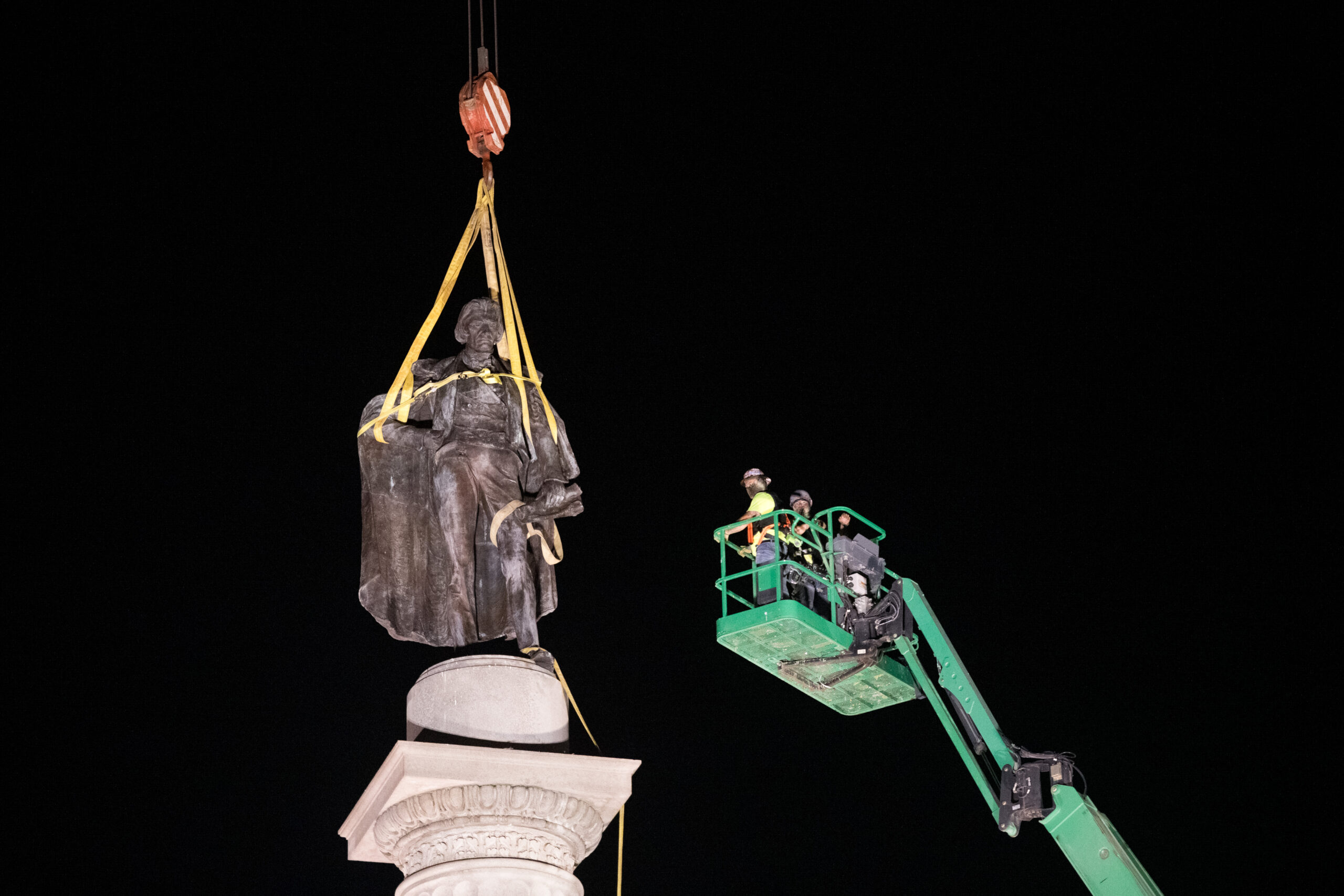Calhoun: American Heretic
By Robert Elder
(Basic Books, 2021)
Russell Kirk observed of John C. Calhoun and his fellow Southerner John Randolph that their sectional descendants failed to learn what was most of value from them: “The more subtle and enduring details of the conservatism for which these statesmen spoke were lost upon the common Southern mind—their distrust of popular fancies, their anxiety for continuity of institutions, their devotion to an ennobling liberty.”
The comment might be expanded to include Calhoun’s detractors as well as his admirers. Once considered by politically diverse observers to be among America’s preeminent constitutional theorists, Calhoun has been relegated by fate to the status of a symbol—for some, the embodiment of inherent national wickedness; for others, the scapegoat in a story of decline from original national purity. Under these conditions, studying Calhoun holds out the possibility not only of a fuller understanding of the man but also of a more nuanced and mature engagement with American history than we find in partisan narratives, whether focused on 1619 or 1776.
Robert Elder’s new biography is a thorough account of the Carolinian’s life. It provides public and private context for his part in the monumental political events of his age. Engagingly written, it is particularly strong in chronicling Calhoun’s shift toward the states’ rights camp and in highlighting his remarkable relationship with his daughter, Anna Maria Calhoun Clemson—his closest confidant and one he considered his intellectual equal.
But for all the book’s useful details and contextualized presentations, it falls short of a unique perspective on Calhoun. Elder takes the task of the historian seriously, so he never embraces the caricature of Calhoun as maniacal genius responsible for all of America’s failures, from slavery to identity politics. But neither does he offer much reason to question that judgment. His final assessment, presented in a lengthy epilogue, largely reflects now-orthodox assumptions.
This is because Elder does not place much emphasis on what is most of value in Calhoun: a penetrating mind focused on understanding and perpetuating republican, constitutional government. There are good reasons for seeing such theoretical pursuits as a driving force in Calhoun’s life. More than those of any other political figure of his day, his writings and correspondence went beyond the issues before him to draw lessons about the nature of self-government. About a year before his death, he wrote in a letter, “I devote all the time left me” to works of political theory. An earlier biographer, Irving Bartlett, concluded that making a contribution to political science, even more than attaining the presidency, was his life’s “ultimate ambition.”
While Elder’s account recognizes Calhoun’s interest in broad questions and acknowledges that there might be some value to his insights, Calhoun as serious thinker is a minor theme in this volume. Moreover, the treatment of Calhoun’s ideas often elides their subtlety and depth. In the final analysis, it offers the now-conventional presentation of Calhoun’s political theory as a by-product of his overriding concern—excusing slaveholding.
Following Charles M. Wiltse’s three-volume biography, Calhoun’s career is often broken into three parts: Nationalist, Nullifier, and Sectionalist. Elder, however, presents more of a two-act play.
The shift from nationalist to nullifier, as Elder presents it, was not as radical as it might appear. It can reasonably be seen as a “course correction” brought on by a combination of changed circumstances, personal honor, political calculation, and genuine principle. In this account, a meeting with John Taylor of Caroline—who, perhaps not coincidentally, also ranks highly among the great political thinkers of the early republic—looms large. Discussing Taylor’s support for Calhoun’s 1824 presidential run, the two “went over the ground very fully,” in Calhoun’s words. Elder observes the perceptible shift in Calhoun’s understanding of the constitution that took place after the meeting.
Elder further emphasizes the fact that Calhoun’s embrace of state interposition—the term he preferred to nullification—neither contradicted his attachment to the Union nor marked him as a radical: “His goal was to keep South Carolina in the Union by preempting many of the more radical elements. . . . While other states’ rights advocates saw only a choice between domination by the federal government or disunion, Calhoun worked creatively, almost desperately, to find the resources for a solution within the system itself.”
Indeed, Calhoun’s original thinking on the matter of interposition—a concept he inherited, along with his “compact theory” of the Union, from the Jeffersonian tradition—came in attempting to place the idea within a national process by which states, acting through conventions (the same organ used to ratify the Constitution) and employing the authority of the amendment provisions, would collectively settle the constitutional controversies that eventually reached a point of crisis and threatened the bonds of Union.
From the outset of Calhoun’s career, through the nullification crisis and until 1837, one would be hard-pressed to identify any trace of Elder’s titular “American Heretic.” Calhoun was, rather, an engaged statesman, committed to a successful Union, who built reasonably strong support in both the North and the South. Along with his fellow triumvirs Henry Clay and Daniel Webster, he shaped the dynamics of political debate on issues from fiscal and monetary policy to presidential power. Across these issues, the republican refrain echoed: concentrated power, even (or perhaps especially) of a democratic variety, was deadly to liberty and self-government.
But the narrative’s tone shifts drastically in 1837. That is the year Calhoun began to speak publicly on slavery, defending it as a “positive good” in the circumstances in which it existed. Following Calhoun’s life is in this respect like reading a Greek tragedy. The aged prophet Thomas Jefferson declares in 1820 that “a geographic line, coinciding with a marked principle, moral and political” would be “held up to the angry passions of men” and would mark “the knell of the Union.” The young Calhoun dismissed such proclamations at the time and for more than a decade denied that doom must come. But inevitably he came to see the dark truth of the prophecy. In the ultimate twist, his recognition of this reality prompted a hyper-defensiveness which merely advanced the march of disunion. Slavery as Ideology
Slavery as Ideology
Elder’s account reinforces the now-commonplace assessment that Calhoun not only defended his section’s “peculiar institution” vigorously but did so in an innovative way. We also see the defense of slavery infusing and informing every other aspect of Calhoun’s thinking. The high-minded statesman disappears. Slavery became his “ideology”; 1838 Senate resolutions on abolitionism “represented his entire political creed”; racial assumptions “unified his thinking” about domestic institutions and foreign policy.
It may seem surprising that most of Calhoun’s other biographers have not found much evidence of a mind obsessed with slavery or race, except insofar as the former had become the most pressing political, social, and constitutional issue. Bartlett, for instance, observed that there is “no reason to believe Calhoun ever studied the history of slavery in detail or that he knew much about racial differences.” He “was never as interested in studying or discussing [slavery] as he was in analyzing political and constitutional issues.” Wiltse saw that the “positive good” argument was no innovation but the articulation of views that had been circulating for decades: “It was the argument John Randolph had used many years before.”
As early as 1805, Jefferson observed that “there are many virtuous men who would make any sacrifices to effect [slavery’s end]. Many equally virtuous … persuade themselves either that the thing is not wrong, or that it cannot be remedied” [emphasis added]. Calhoun’s paternalistic ideal of slavery, which saw the interest of the laboring slave and the capital-owning master as harmoniously blended in the plantation “community,” had been taking over the Lower South for decades before he began publicly discussing slavery. He imbibed this view from an early age and never subjected it to scrutiny. Indeed, the secondhand, uncritical, and occasionally lazy nature of Calhoun’s slavery arguments (his “Pakenham Letter” is a perfect example) stands in marked contrast to his subtle and always tightly argued political and constitutional ideas.
While he acknowledges that others made similar arguments, Elder nevertheless treats Calhoun’s ideas about slavery as pathbreaking, furthering the impression that Calhoun’s intellectual talents were those of the evil genius. Elder notes that Calhoun expressed the “positive good” view to John Quincy Adams as early as 1820 and takes this as a “preview of how Calhoun would radically refashion” the defense of slavery nearly two decades later. It might be stronger evidence that the “refashioned” argument was in the water long before Calhoun took it up.
The view of Calhoun as an innovator fits with a broader theme of the book, namely that Calhoun saw himself as a modernizer rather than someone looking backward or seeking merely to preserve a fading past. This will be a welcome interpretation to those on the right who, in redefining conservatism along the lines prescribed by Harry Jaffa, have successfully excised Calhoun from the conservative canon. This impression, however, also results from devaluing Calhoun as a theorist.
Yes, Calhoun was excited by technological innovations, valued lowercase-p progress, and hoped that a better understanding of constitutionalism was emerging in the modern world. And no, he did not see himself or his section as a dying anachronism. But his most profound and timeless reflections were distinctively conservative. The political sages from whom he drew his intellectual breath were Aristotle, Cicero, Polybius, and Burke. He warned against a fetishized view of progress, the rule of centralized, numerical democracy, and the idea that philosophical abstractions could serve as the basis of durable liberty. In old republican fashion, he saw that it was “difficult to get a good Government, and still more difficult to preserve it.” His Disquisition examined the complex interplay between republican virtue and political institutions with a depth that no other American thinker had before.
Such conservative insights are not a major part of Elder’s presentation. By treating Calhoun’s thought as defined by slavery and by undervaluing his contribution to political theory, we overlook or misapprehend these powerful insights that outlive his own sometimes misguided applications of them.
We also lose another possible lesson. By nearly all contemporary accounts, Calhoun was supremely intelligent, public-spirited, and forthright. But he was lacking in a particular virtue that his age and our own both desperately need—political humility and the self-reflection that comes with it. Calhoun was almost always sure that he was right.
On many issues, one can make a strong case that he was. But on the most pressing moral issue of his day, he was not—and he was largely incapable of turning his impressive powers of examination upon his own and his section’s practices. A just assessment of Calhoun requires attention to his virtues as well as his vices. His life reminds us how political pride often blinds even the wise and patriotic to their own faults.
Calhoun will ever bear a burden for his moral blindness in this, his afterlife. Yet, as Kirk and others over the years were able to perceive, his voice remains like that of a Cassandra to the ears of those who do not wish to hear of the limits of politics, the fragility of liberty, or the inevitable fate of mass democracy. Modern man needs lessons on the dangers of self-assured, ideological pronouncements about deep moral issues. We dismiss Calhoun at our peril.
John G. Grove is managing editor of Law & Liberty and is the author of John C. Calhoun’s Theory of Republicanism.














